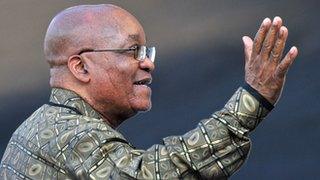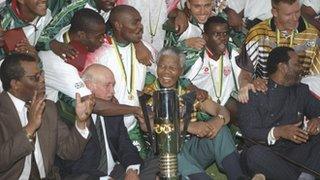Africa Cup of Nations: Countdown to South Africa
- Published
Is South Africa set for Nations Cup?
South Africa will soon host the Africa Cup of Nations, two years and seven months after they became the first African country to provide the stage for the World Cup.
South Africa received high praise for the success of the 2010 tournament and for its construction of several new world-class stadia, and was awarded the 2017 Nations Cup.
Then 14 months ago, the plan to host the 2013 edition of the tournament in Libya fell apart after civil war broke out in the country, leading to the death of Muammar Gaddafi - and South Africa stepped in.
Fifteen nations are soon to arrive for the 29th edition of the tournament, which will be played between 19 January and 10 February. Is South Africa ready?
"We are comfortable with plans that have been put into place, in terms of details and operational execution," said Mvuzo Mbebe, chief executive officer of the local organising committee.
But he conceded "there's been a lot of fair criticism that people have not seen enough branding around various cities" and promised that visibility will increase shortly.

President Zuma is confident South Africa will again prove successful hosts
The government has allocated 452 million rand (£32m) to the tournament, of which 83 million rand (£5.8m) has been assigned to the organising committee. The rest will go to the beautification of host cities and to national departments for logistical costs.
While the World Cup averaged 49,000 spectators per game, and 93% of tickets were sold, filling stadia for Africa Cup of Nations matches has historically proved a much harder task.
Earlier this year, in Equatorial Guinea, only 200 fans were present for the quarter-final between eventual champions Zambia and Sudan in Bata. The 2013 organising committee made ticket sales its number one priority, and in phase one of their campaign they sold 20,000 - double their original target.
The demographic of South Africa's population has helped, too. The Ethiopian Football Association has requested 15,000 tickets to accommodate their fans as they compete in a major tournament for the first time in 30 years.
Champions Zambia are expecting to sell 10,000 tickets to their followers.
South Africa president Jacob Zuma says hosting the tournament will be "a timely reflection on the legacy of the 2010 Fifa World Cup, which we hosted successfully with the support of the African continent".
In a nation where half the population live below the poverty line, tickets have been priced sensibly, with fans able to watch two games for 45 Rand ($5) - since 1978, group matches have been played as double headers in the same stadium.

Nelson Mandela (centre) celebrates with Bafana players after the 1996 Nations Cup victory
For a tournament that wasn't televised until the mid-1980s, the growth has been impressive.
The Confederation of African Football (Caf) says, cumulatively, the 32 matches in the 2012 tournament were watched by 6.6 billion people, providing 87,072 hours of television exposure to sponsors.
It's one thing being good party hosts, but can South Africa perform on the pitch in 2013?
Some see similarities to the 1996 tournament, which South Africa hosted and won only two years after the free elections that saw Nelson Mandela become president.
Hosting the World Cup and now the Nations Cup is seen by many as a watershed moment, the crest of a wave that Bafana Bafana can ride all the way to the final in Johannesburg.
To lift the trophy for a second time South Africa will have to overcome some of the traditional powerhouses of African football.
Ivory Coast are the clear favourites with the bookmakers as Didier Drogba and his experienced team look to make amends for their penalty loss in the 2012 final against Zambia.
Ghana and Nigeria have in recent times failed to deliver in the finals of the tournament - Ghana's last win came in 1982 - and Nigeria haven't won the tournament since 1994.
And with Egypt, Cameroon and Senegal all having failed to qualify, the door is ajar for Bafana Bafana's 'boys' to turn into men.
- Published13 December 2012
- Published24 October 2012
- Published28 September 2011